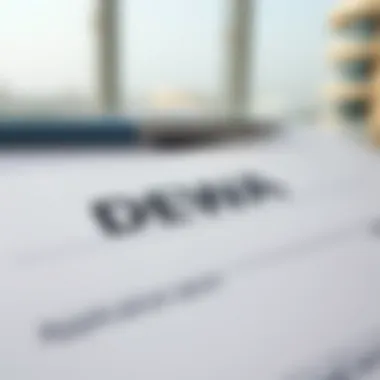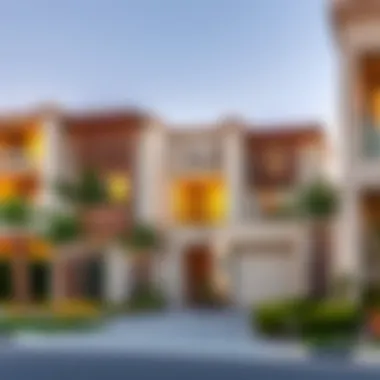Dewa Connection Requirements for Dubai Real Estate


Intro
Navigating the intricate landscape of real estate in Dubai requires not just an understanding of market trends but also a grasp of essential utilities like water and electricity. The Dubai Electricity and Water Authority, commonly referred to as DEWA, plays a pivotal role in facilitating these connections. This guide is tailored for potential homeowners, renters, investors, realtors, and developers aimed at demystifying the connection requirements necessary for accessing these utilities in residential properties across the emirate. Understanding this facet is crucial for smooth transactions and ensuring compliance with local regulations.
Market Trends and Insights
Current Market Analysis
Dubai's real estate market functions like a finely tuned clock. Transitioning from a buyers’ market to a more balanced scenario, we see mid-tier properties gaining traction alongside high-end units. Given the emirate's strategic location and robust infrastructure, including expansive developments and a booming tourism sector, many investors believe the market offers significant long-term value. Recent statistics from the Dubai Land Department have shown a steady increase in property transactions, highlighting a renewed confidence among investors concerning rental returns and commercial opportunities.
Historical Trends and Future Predictions
Reflecting on the past decade, the property market in Dubai has experienced its fair share of ups and downs. After the economic downturn in the late 2000s, stability was regained by the early 2010s, leading to a surge in developments. Predictions for the next few years suggest continued growth, spurred on by government initiatives and a favorable regulatory framework. Recent trends indicate not just a revival in investments but also greater interest from overseas buyers, particularly in practically all sectors, from luxurious waterfront developments to affordable suburban options.
“Investors are increasingly favoring properties that comply with sustainability and smart technologies, indicating a shift in consumer preferences.”
Property Listings and Comparisons
Luxury Properties Overview
Luxury properties in Dubai provide an alluring glimpse into the high end of the market. Offering not just lavish amenities but also cutting-edge designs, these homes often attract expatriates and wealthy nationals alike. Developments like Palm Jumeirah and Dubai Marina boast properties that redefine opulence. Potential buyers should consider factors such as proximity to schools, healthcare facilities, and leisure activities which significantly influence property values.
Affordable Housing Options
Conversely, affordable housing options are gaining momentum thanks to increasing demand from first-time buyers and families seeking stability. Areas like Dubai Sports City and Jumeirah Village Circle offer a wealth of options without the hefty price tags found in more high-profile locations. Investors looking to enter the market or renters seeking balance might find this category particularly appealing.
In navigating the property landscape, understanding DEWA's connection requirements becomes essential. These utilities are not just a matter of convenience but integral to living comfortably in Dubai's dynamic environment.
Overview of Dewa Connection
When diving into the real estate realm of Dubai, having an understanding of Dewa connection requirements is absolutely crucial. The Dubai Electricity and Water Authority (DEWA) is the lifeblood of essential utility services within the emirate, granting access to water and electricity that is pivotal for everyday living, business operations, and overall infrastructure stability.
Importance of Utility Connections
Utility connections aren’t just a formality; they are a vital framework that supports any property, whether residential or commercial. Think of it this way: without electricity, you're living in a literal dark age, and without water, it's hard to imagine a comfortable life. Investors and homeowners need to acknowledge that these connections directly influence property value and appeal. For instance, a property lacking proper utility connections might face delays in occupancy or, worse yet, can't fulfill buyers' expectations.
Moreover, established utility connections contribute to the weathering of market fluctuations. The ability to promptly secure these connections can set your property apart in a bustling landscape where many are vying for attention and investment. In simple terms, obtaining Dewa services first and foremost is not just a box to tick; it's pivotal for the functionality and livability of a property.
DEWA's Role in Dubai's Infrastructure
DEWA has an intricate position in shaping Dubai's landscape. Their work transcends the simple provision of services; it encapsulates the ongoing development of the city's infrastructure. With initiatives focusing on sustainability, DEWA has been pushing the envelope towards greater energy efficiency and water conservation.
Take this crucial role into account: DEWA participates in many smart city programs, integrating advanced technologies to ensure that utility services are efficient, reliable, and environmentally responsible. The authority is not merely a service provider; it acts as a partner in Dubai's ambitious goals for modernization and sustainability. This synergy aligns well for not only residential players but also commercial establishments looking to bolster their operational base in Dubai. Investors and developers should see DEWA as a vital collaborator in their business strategy.
"Understanding the DEWA connection process isn’t just about meeting regulations; it’s about enhancing your property’s value and operational readiness."
Eligibility Criteria for Connection
The eligibility criteria for utility connections through the Dubai Electricity and Water Authority (DEWA) play a vital role in ensuring that both new homeowners and investors can successfully access essential services. Navigating these requirements not only streamlines the process but also fosters a smoother integration into Dubai's vibrant property market. Understanding these criteria can prevent potential hiccups and allow for a proactive approach in setting up utility services.
Types of Properties
Residential
When it comes to residential properties, the eligibility for DEWA connection is primarily focused on the type of dwelling and its occupancy status. A prominent feature of residential properties is their diverse nature, ranging from flats to villas. This wide range caters to different lifestyles and preferences, making them a popular choice for new inhabitants. One key aspect is that many residential properties in Dubai come with guidelines on energy consumption, contributing to sustainable living. This focus on efficiency benefits homeowners by potentially lowering utility bills in the long run. However, it's essential to keep in mind that not all types of residential units may qualify under the same criteria. For example, older buildings might face stricter inspection protocols compared to modern constructions that comply with current regulations.


Commercial
On the commercial front, properties such as office buildings and retail spaces are under a different set of criteria when applying for utility connections. The significant characteristic here is the scale of usage; commercial tenants typically consume more energy and water than residential customers. This fact makes it essential for potential business owners to understand that these types of properties will have specific demands related to their operation hours and peak consumption times. Furthermore, commercial properties often require detailed plans that outline not only the intended usage but also the potential load on the infrastructure. The benefit of commercial properties, however, lies in their capacity for growth; businesses often find themselves expanding, which can necessitate an upgrade in utility services – a topic relevant to DEWA's guidelines.
Documentation Requirements
Identification Documents
In terms of identification documents, these are non-negotiable for both residential and commercial applications. Typically, DEWA mandates valid ID proofs to establish the identity and legality of the applicant. This might include Emirates IDs or passports, which ensure a straightforward linkage between the utility service and the individual or entity requesting it. Alongside contributing to the credibility of the application, they help streamline the verification process. A unique feature of these documents is that they must be up-to-date! Outdated information could lead to unnecessary delays in obtaining your utility connection.
Property Ownership Proof
For property ownership proof, applicants must present relevant documentation that states their legal ownership of the property. A common requirement includes a title deed or rental contracts, especially for those in rental agreements within Dubai. This aspect is critical because ownership not only validates an application but also ensures the accountability of utilities used. The notable advantage of having documented proof of ownership or tenancy is it strengthens the claim for connection. On the flip side, it’s necessary to be meticulous about the accuracy of these documents; discrepancies can lead to significant bumps on the road to establishing utility services.
"Ensuring all documentation aligns with DEWA’s requirements can greatly expedite your connection process, eliminating the chance of processing delays."
By grasping the nuances of eligibility criteria, property types, and required documentation, potential homeowners and business owners can pave the way for a seamless connection to Dubai's utility services, reinforcing the foundational aspects of their investments.
Application Process for DEWA Connection
The application process to obtain a DEWA (Dubai Electricity and Water Authority) connection is a significant step for anyone looking to establish utility services in Dubai. A streamlined application not only facilitates smooth access to essential resources, such as electricity and water, but it also holds implications on property value and investment viability. Often, investors and homeowners overlook the specifics of this process, which can lead to unforeseen delays and additional costs. Understanding the steps involved is, therefore, crucial for anyone navigating the Dubai real estate landscape.
Step-by-Step Guide
Online Application
The online application process for DEWA connections offers a convenient and efficient way for applicants to initiate service requests. Primarily, this method allows users to fill out forms from the comfort of their homes or offices, transcending geographical barriers. The key characteristic that sets online applications apart is their accessibility; many people appreciate being able to manage the entire process digitally without the hassle of traveling.
One unique feature of the online application is the ability to track the status in real time. This visibility can be incredibly beneficial for applicants in allowing them to plan their moves or renovations with a clearer timeframe. However, some might find the process daunting due to technical issues or the need for a stable internet connection. Still, for most, the benefits outweigh any potential downsides, making it a popular choice among tech-savvy homeowners and investors.
In-Person Application
In contrast, the in-person application method provides a more personal touch, allowing face-to-face interaction with DEWA representatives. This approach may be preferable for individuals who seek immediate clarification or have complex issues. A key characteristic of this method is the opportunity for real-time consultation, which can often lead to a more tailored response to a customer's needs.
An added benefit of applying in person is the sense of assurance some feel when dealing with officials directly. Nevertheless, this route can be time-consuming, often requiring individuals to visit service centers during business hours. Potential applicants should weigh this against their availability and personal preferences when deciding on the application method.
Processing Timeline
Standard Time Frames
Understanding the standard processing timelines associated with DEWA connections lays the groundwork for future planning. Typically, standard requests have a set timeframe, generally providing service connections within a few business days to a couple of weeks, depending on the specifics of the application. This predictability allows prospective homeowners and investors to plan their activities accordingly—such as moving dates or renovations—thus enhancing overall project management.
The benefit of knowing these standard time frames is substantial; it helps in budgeting for associated costs related to the transition into a new home or property. However, applicants should revisit these estimates periodically, as delays due to external factors can occur, emphasizing the need for flexibility.
Expedited Requests
On the other hand, expedited requests cater to those needing faster service, which can be particularly advantageous for urgent projects. This option is designed for applicants who may have tight deadlines to meet or significant delays that could result in financial loss. The characteristic that makes expedited requests appealing lies in their swiftness, often facilitating connections in a matter of days rather than weeks.
However, this service typically incurs additional fees and may not be available for all connection types. Hence, individuals should assess whether the benefits justify the costs. Ultimately, expedited requests serve as an invaluable option for those facing time constraints in a competitive real estate market.
Successful navigation of the application process is not just about getting utilities; it's about positioning oneself favorably within the rapidly evolving Dubai real estate framework.
For more details, you might visit DEWA Official Website or check out related discussions on Reddit - Dubai Real Estate.
Connection Costs and Fees


When managing a property in Dubai, understanding connection costs and fees remains a vital component. These expenses directly impact your overall budget and can influence tenure decisions, especially if you're weighing between several properties. Knowing what to expect financially can prevent unexpected surprises and help inform better financial planning.
Initial Connection Charges
Initial connection charges typically encompass two key fees—the service fees and security deposit.
Service Fees
Service fees primarily cover the administrative aspects of setting up your connection with DEWA. It's like a one-time nod of appreciation for the paperwork and processes they have to tackle. These fees, often viewed as an upfront investment, ensure you have the utilities running smoothly when you need them most.
The most notable characteristic of service fees is their variability based on property type. For instance, larger or commercial properties might face higher fees due to the increased demand on services. This aspect makes it crucial for potential homeowners or investors to consider the specific rates that apply to their type of property, as they could differ widely.
The unique feature of these fees is that they are generally non-refundable, meaning once you’ve forked over that cash, it's gone. For many, this becomes a point of concern. Still, it's valuable to remember that this initial outlay lays the groundwork for essential services that allow living or operating in Dubai without hindrance.
Security Deposit
Moving on to security deposits, this amount acts as a safeguard for DEWA against any defaults on payment. Essentially, it's like a safety net for the utility provider, offering them assurance should you fail to pay your subsequent bills.
Highlighting the key characteristic here is that security deposits are typically refundable upon closing the account. This makes it a somewhat less daunting financial commitment, as long as you remain diligent about payments and ensure you're not on DEWA's bad side.
It's crucial to be aware that the deposit amount can fluctuate based on factors like your property's size and the estimated consumption levels. Some landlords and tenants find it a common practice to negotiate this deposit, especially if they're seen as reliable and have a history of timely payments.
Monthly Utility Charges
Once the connection is established, monthly utility charges come into play. These are the charges that keep the lights on and the water flowing. Two primary components, water rates and electricity rates, warrant a closer look.
Water Rates
Water rates are crucial as they reflect the cost incurred for using Dubai's water supply. For residents and businesses, these charges might be proportionate to their consumption, which underscores the importance of monitoring usage over time. The uniqueness of water rates lies in their tiered structure; essentially, as consumption increases, rates may jump into higher brackets. This could mean that using less can translate to considerably lower bills, encouraging conservation practices.
The installation of smart meters in various areas can assist in understanding usage patterns, making it easier for residents to adjust their habits and potentially save money.
Electricity Rates
Electricity rates, on the other hand, are another crucial piece of the puzzle. These rates also operate on a tiered system where higher consumption leads to more expensive kWh rates. Since energy usage can fluctuate significantly based on the season and the size of a dwelling, it’s wise for investors or homeowners to anticipate these variations.
One unique feature of electricity charges to keep in mind is that incentive programs can be available for adopting energy-efficient practices. Embracing renewable energy sources or energy-saving installations can lead to considerable savings in utility costs over time.
In summary, a clear understanding of connection costs and fees related to DEWA connections in Dubai can aid investors, homeowners, and tenants in better financial planning while navigating the city’s real estate landscape. It encourages an insightful approach to budgeting, ensuring that all parties remain well-informed about the ongoing financial obligations involved in maintaining a property.
"Understanding the nuts and bolts of connection fees isn't just useful—it's essential for smart investment choices."
Sources useful for further information include Department of Energy, Government of Dubai, Dubai Land Department, and various forums like Reddit discussing utility experiences.
Common Challenges When Applying
Applying for a DEWA connection can seem straightforward, yet it comes with its own set of challenges that could trip you up if you're not careful. These hurdles can range from documentation issues to prolonged processing times, both of which could throw a wrench in your plans. For homebuyers, investors, and even seasoned developers, understanding these difficulties is crucial. Identifying potential roadblocks and knowing how to navigate them can save a fair amount of time and stress down the line.
Incomplete Documentation
One of the most common headaches when applying for a DEWA connection arises from incomplete documentation. This particularly affects first-time applicants, as they may not fully comprehend the exhaustive list of documents needed. Missing even one item can result in delays or outright denial of service.
Documents usually required include:
- Identification Documents: Passport copies or Emirates IDs.
- Property Ownership Proof: Title deeds or contracts supporting your ownership.
- Local Authority Approval: Permits for construction if it’s a new build.
- No Objection Certificate (NOC): Required in some cases, particularly for commercial properties.
To prevent hiccups, it’s wise to compile all necessary documents before submitting your application. Double-check everything; a minute oversight can lead to cascading effects, which is not something anyone wants to face when working to get utilities connected and operational.


Tip: Create a checklist of necessary documents and gather them before starting the application process. This can save considerable time and cut down the mental stress.
Extended Processing Times
Next up is the unwelcomed possibility of extended processing times. The timeline for DEWA connections isn't set in stone and can vary widely based on numerous factors ranging from application volume at DEWA to the specificity of your property type. Sometimes, the wait can stretch from a couple of days to several weeks, causing frustration for anyone eager to settle into their new home or office space.
A few reasons for such delays may include:
- High Demand: During peak seasons, the backlog can increase exponentially.
- Application Errors: Even small mistakes can delay your application significantly.
- Inspections: If your property requires an inspection prior to connection, scheduling may add additional time.
Understanding that extended processing times could be a part of the experience is essential. Prepare accordingly. If you anticipate a longer wait, plan around it—set up provisional utility options or temporary solutions until DEWA gets your property up and running. Ultimately, knowledge of these potential delays can help you maintain a level head as you navigate the DEWA connection process.
Questions and Answerss Regarding Dewa Connections
Frequently asked questions (FAQs) about DEWA connections play a crucial role in helping potential homeowners and investors navigate the complexities of obtaining utility services in Dubai. By addressing common concerns, these FAQs enhance the user's understanding of the process and result in a more efficient and stress-free experience. It's essential to be well-informed about the requirements and protocols for connecting to Dubai's electricity and water services, as this knowledge can save time and effort. Understanding the most pertinent questions related to DEWA connections enables property buyers, realtors, and developers alike to streamline their dealings, anticipate problems, and facilitate smoother transitions into their new living or investment spaces.
What to do if Connection is Delayed?
Delays in obtaining DEWA connections can be a headache for both investors and homeowners. If your connection is dragging its feet, the first step is to reach out to DEWA directly through their customer service channels. You can either call or use their online support. Gather your application details before you make contact, as this will help expedite the resolution process.
While reaching out, be prepared to provide:
- Your application number
- Identification documents
- Any pertinent communication you've had with DEWA.
Another option is to check your application status online through the DEWA website. If your connection is still pending after addressing any concerns or missing documents, don’t hesitate to inquire about using an expedited request service. This could sometimes bump your application up the queue.
Can Connection be Transferred?
Transferring a DEWA connection is indeed possible, but it comes with specific guidelines. If you’ve purchased a property but the utility connection is still under the previous owner's name, you can initiate a transfer request through DEWA's customer service. This typically involves submitting a few essential documents, such as proof of ownership and identification.
Points to consider for the transfer include:
- Authority: Ensure that the previous owner is willing to facilitate the transfer.
- Documentation: Gather necessary documents like sales agreements and ID copies to prove ownership.
- Fees: There may be administrative fees associated with the transfer process.
It is always a good practice to confirm the latest policies on DEWA’s website, as they can change over time. Ultimately, a seamless transfer not only solidifies your claim to the property but also sets the stage for a comfortable living experience.
Importance of Sustainable Practices
In today's world, the significance of sustainable practices cannot be overlooked. As we delve into the Dewa connection requirements for real estate in Dubai, understanding the importance of sustainability shapes not just community values but impacts economic performance and environmental health. These practices not only align with the global push towards greener living, but they also resonate strongly with Dubai's vision of becoming a sustainable city. Adopting eco-friendly habits can bring about significant benefits—be it for investors, developers, or homeowners.
Among the key benefits of sustainability is energy conservation. Efficient use of energy resources translates to lower utility bills, which appeals to homeowners looking to stretch their financial limits. Moreover, properties that emphasize energy efficiency often enjoy higher market values, ultimately attracting discerning buyers who recognize the long-term advantages.
Adopting Energy Efficiency
Energy efficiency is at the heart of sustainable living. Implementing energy-saving measures can significantly reduce the demand for electricity from DEWA. Simple actions such as using LED lighting, energy-efficient appliances, and smart thermostats can make a notable difference in energy consumption. Such technologies not only contribute to low energy bills but also promote a greener environment.
In addition, many new developments in Dubai are being constructed with energy-efficient standards, making them more attractive to potential homeowners and investors.
When looking to connect utilities, keep in mind that adhering to DEWA's energy efficiency guidelines can facilitate the application process. Homes and businesses that demonstrate an investment in energy efficiency may encounter fewer hurdles when seeking connections and inspections. In contrast, properties lacking energy-conscious designs may face delays in approvals.
Water Conservation Measures
Water is a precious commodity in the arid landscape of Dubai, making water conservation measures essential in any sustainable practice. Adopting water-saving technology not only reduces monthly utility costs but also contributes to a broader effort to secure resources for future generations.
Common practices include:
- Low-flow fixtures: These significantly decrease water usage while maintaining functionality, ideal for both residential and commercial properties.
- Rainwater harvesting systems: Capturing and utilizing rainwater for irrigation helps reduce dependency on the municipal water supply.
- Drip irrigation: Often employed in landscaping, this method ensures minimal waste while providing your plants with adequate water.
By integrating these water-saving measures, property owners demonstrate a commitment to sustainability and efficiency that is increasingly vital in today's marketplace. This approach not only enhances the property's value but aligns with the growing consumer demand for environmentally responsible living.
"Sustainability is not just a trend—it's a necessity for maintaining our way of life and protecting our planet for future generations."















